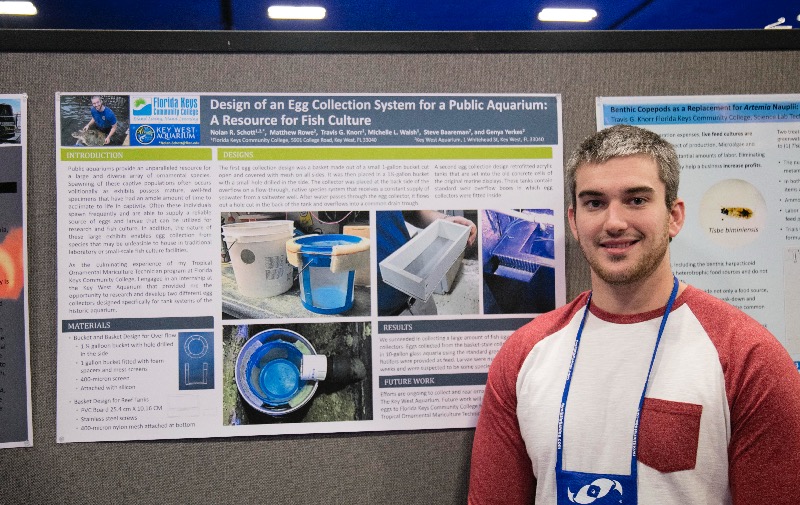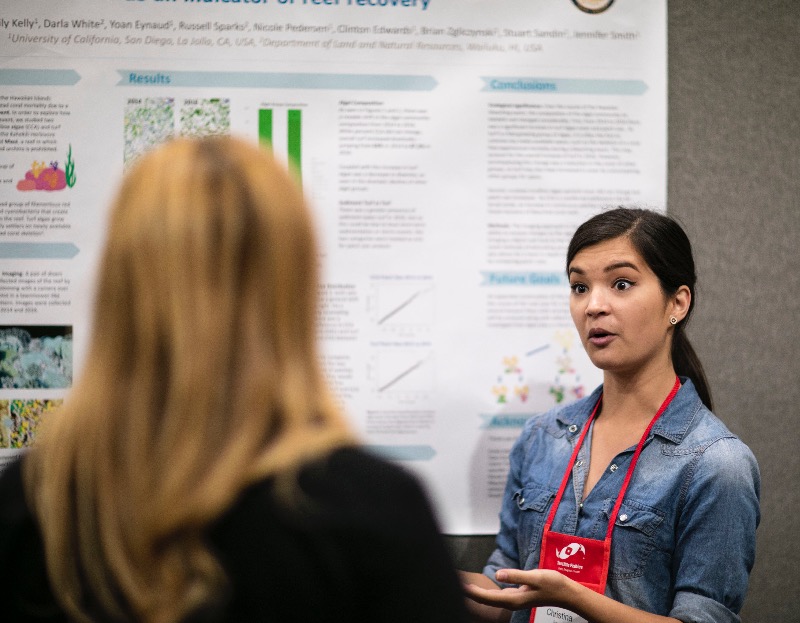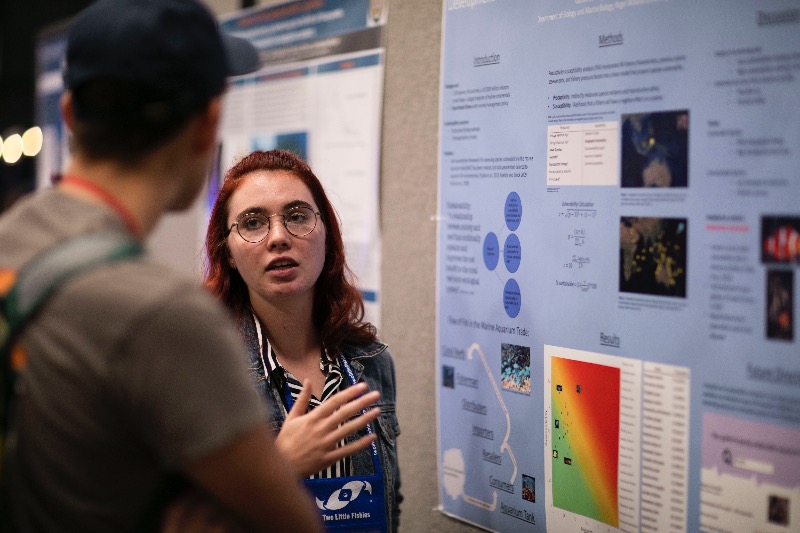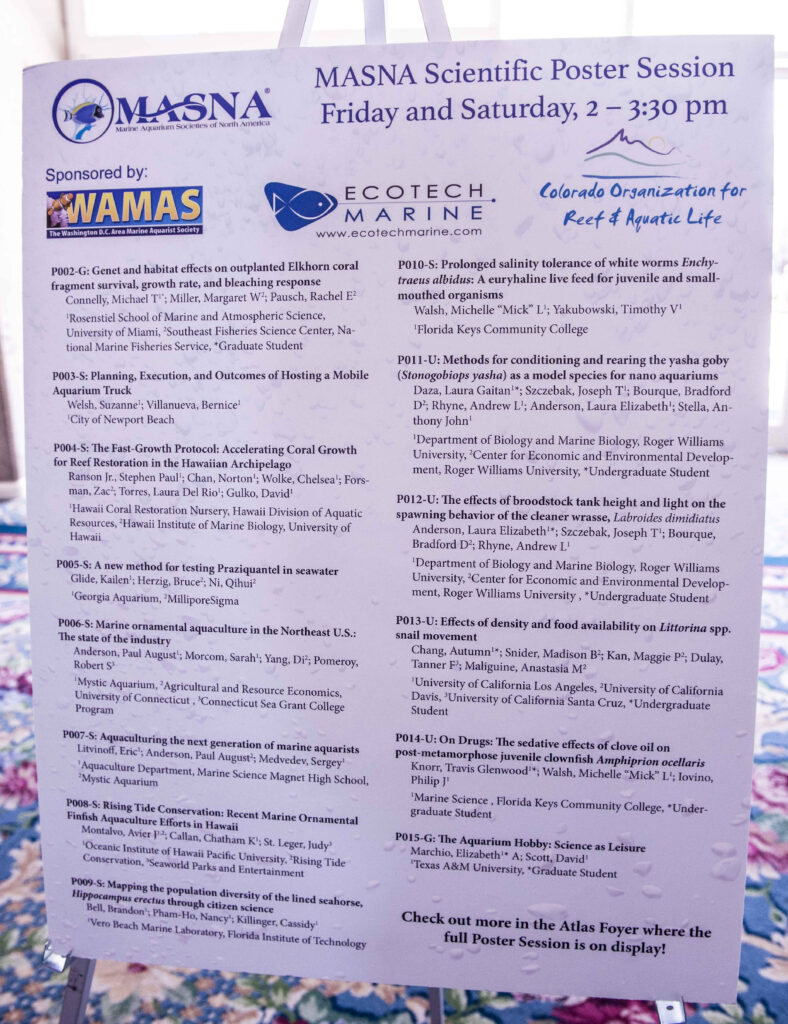
An example of poster sessions from past MACNAs; 2016’s session list is shown here. Scientific posters present information in a standardized format and allow visitors to interact with the researchers responsible for the work.
via MASNA
Abstract submissions for the 4th Annual MASNA Scientific Poster Session are open until July 15th, 2019.
The MASNA Scientific Poster Session allows advanced aquarium hobbyists, undergraduates, graduate students, and scientists to submit scientific posters on their current or past marine aquarium–related research projects.
This is an excellent opportunity for all levels of science-minded individuals to present their findings to a broad community of hobbyists, scientists, and industry leaders. We encourage anyone interested to submit an abstract.
Posters will be judged by a committee that consists of advanced hobbyists and scientists. Prizes will be awarded for posters in each of the three following categories: general hobbyists, undergraduate students, and graduate students.
MASNA requires that presenting authors be present at MACNA 2019 to convey their findings and encourages presenting authors to consider volunteering at MACNA 2019 to offset the cost of a weekend ticket. For more information on MACNA 2019 volunteer opportunities, please see https://macnaconference.org/2019/volunteer/.
The 4th Annual MASNA Scientific Poster Session is made possible by our generous sponsors: Washington DC Marine Aquarist Society (WAMAS), Colorado Organization for Reef & Aquatic Life (CORAL), and EcoTech Marine.
Poster abstract submissions will be open until July 15th, 2019.
Last year, the MASNA Scientific Poster Session was well represented by a suite of qualified scientists, hobbyists, and industry representatives. Below you will find some highlights of the 2018-2019 MASNA Scientific Poster Session.
Congratulations to J. Alexander Bonanno (graduate) and Nolan Schott (undergraduate, left) for winning Best Poster in Session in their respective categories! John’s poster, titled “Combating Cyanide Fishing by Determining the Half-Life of Thiocyanate in the Marine Fish Amphiprion ocellaris,” addressed a damaging collection method that is still prevalent in wild-caught fishes today.
Nolan Schott represented the Florida Keys Community College in his presentation, titled “Design of an Egg-Collection System for a Public Aquarium,” where he detailed the design of an egg-collection system that can be used to harvest eggs from large public displays.
Christina Jayne (graduate) represented the Scripps Institute of Oceanography in her presentation, titled “Crustose Coralline Algae and Fleshy Algae Cover as an Indicator of Reef Recovery,” which investigated the dynamic changes in the algal community following a prolonged bleaching event that occurred across the main Hawaiian Islands in 2015.
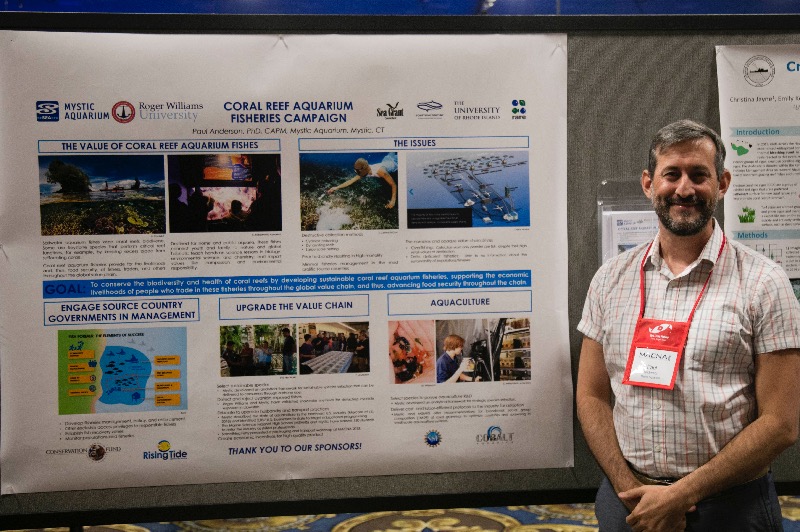
Dr. Paul Anderson, Mystic Aquarium, presenting the “Coral Reef Aquarium Fisheries Campaign” at the 2018 poster session.
Dr. Paul Anderson represented the Mystic Aquarium in his presentation titled “The Coral Reef Aquarium Fisheries Campaign,” which highlighted a collaborative initiative that seeks to conserve the biodiversity and health of coral reefs by developing and promoting sustainable aquarium fisheries.
Gabbie Baillargeon (undergraduate) represented Roger Williams University in her presentation titled “Which Fish Should I Buy?” which discusses the development of a user-friendly smartphone app that hobbyists can use to identify sustainable options when purchasing the newest member of their reef tank.
For More Information:
Additional information and the abstract submission form can be found here:
masna.org/masna-programs/masna-scientific-poster-session
Additional information about MASNA can be found here:
masna.org/aboutus
Additional information about MACNA 2019 can be found here:
macna.org
###
About MASNA
MASNA is a non-profit organization composed of marine aquarium societies and individual hobbyists from North America and abroad, totaling several thousand individuals.
MASNA’s goals are to:
- Educate our members with online and published material, the MACNA conference, and other sanctioned events.
- Assist in forming and promoting the growth of clubs within the hobby while ensuring a sustainable future for the marine environment.
- Support the efforts to eliminate abuses in collecting and transporting marine organisms through education, assistance and encouragement.
- Encourage the ethical growth of the marine aquarium hobby and support captive breeding/propagation efforts.
